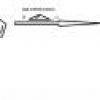 71
71The given expression is an equation of circle with center at (3,3). We take any parametric point on it as
(\sqrt{6}cos\theta +3,\sqrt{6}sin\theta+3)
Clearly \frac{y}{x}=\frac{(\sqrt{6}sin\theta+3)}{(\sqrt{6}cos\theta +3)}, So we need to find the maximum value of this expression on right side.
 71
71For Maximum, Denominator should be minimum ie.., \theta = \pi and we have Max(\frac{y}{x})=\frac{\sqrt{3}}{\sqrt{3}-\sqrt{2}}\approx 5.44948
 1
1@vivek i doubt your second post.
 71
71For Minimum, I used calculus and the answer doesn't comes out very neat \theta_{min}= \frac{-\pi}{4}-sin^{-1}(\frac{-1}{\sqrt{3}})
 71
71@Rishabh, Alternatively you can try calculus.
 71
71If You have any other answer kindly post it!
 341
341you dont need calculus. you are to find the max and min slopes of lines from origin that intersect or touch the given circle. So the extremal angles correspond to the slopes of the two tangents that can be drawn from the origin.
Simple geometry gives the two angles as
\frac{\pi}{4} \pm \tan^{-1}\frac{1}{\sqrt{3}}
hence the min and max are \frac{\sqrt{3}-1}{\sqrt{3}+1} and \frac{\sqrt{3}+1}{\sqrt{3}-1} respectively
 1708
1708inspered from bhatt sir post (answer)
http://forum.100percentile.com/iitjee_aieee_forums/posts/list/30859.htm#122779
